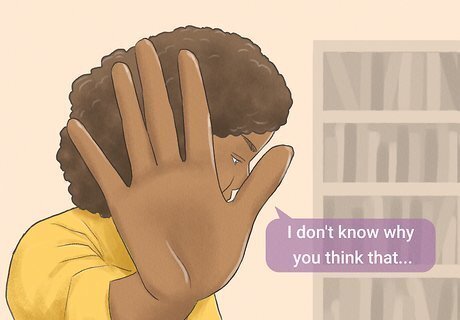
views
Spotting a Covert Narcissist

They have little respect for the feelings of others. Narcissists suffer from a serious deficit in empathy, which makes them unable to take the experiences and needs of other people seriously. If you’re having an hour-long conversation with a covert narcissist, they might never ask you a single question about yourself. Some other examples of covert narcissism include: Standing you or others up at a date or other meet-up Expecting others to accommodate them, regardless of how convenient it is Refusing to do anything to help you unless they can expect something in return

They express a sense of superiority to others. Unlike overt narcissists, covert narcissists might put on a facade of self-deprecation, turning things they don’t like about themselves into a joke. But they really believe, as all narcissists do, that other people are somehow less worthy, intelligent, or capable than them. Signs of a secret sense of superiority might include: Making passive-aggressive comments about other people’s abilities Boastful claims that aren’t backed up by reality, i.e. “I’m the best employee here” An unwillingness to listen to others

They surround themselves with admirers who never disagree with them. Just like overt narcissists, covert narcissists rely on a constant supply of admiration from people around them to prop up their sense of self. For covert narcissists, other people ultimately exist solely to serve them. If you’ve noticed that none of the people that someone spends time with ever stand up to them or offer them anything but praise, they may be a narcissist. Narcissists tend to be more vulnerable than most people—to protect themselves, they surround themselves with others who pose no threat to their self-worth.

They respond to constructive criticism with rage. Criticism stings a narcissist much more deeply than it might for non-narcissists. The idea that other people see a narcissist as imperfect can be intolerable for them. After experiencing criticism, a narcissist may have serious mood swings or become extremely defensive. Covert narcissists have a tendency to play the victim. They may say something like, “I don’t know why everyone is ganging up on me” in response to even neutral feedback.

They attempt to gaslight you. While an overt narcissist might openly try to bully you into compliance with their wishes, a covert narcissist is more likely to passive-aggressively make you doubt yourself. This tactic is called gaslighting, and is an attempt to make you feel crazy or misguided. For example, a covert narcissist in a romantic relationship might say something like, “I don’t know why you would even think that I was into you like that.” Or, a covert narcissist colleague at work could say, “If you needed me to help you with this project, you should have made your expectations more clear.” If you feel like you’re being gaslighted, try talking to a friend or other neutral party about the situation. They can help you by reaffirming that your interpretation of the events isn’t wrong.
Responding to a Covert Narcissist

Remember that you’re not the cause of a narcissist’s behavior. Try not to take a covert narcissist’s treatment of you personally. Their behavior comes from a deep sense of woundedness—in other words, if a narcissist is making you feel terrible about yourself, this says more about them than it does about you. When a covert narcissist treats you poorly, ask yourself why other people don’t treat you the same way. This can be a good reminder that a covert narcissist’s perception of you isn’t reality. If a narcissist is harming your sense of self-worth and inner peace, practicing meditation or mindfulness exercises can give you a sense of emotional strength.

Assert your right to speak when being silenced. Narcissists tend to rely on tactics of silencing other people to get their way. Try to stand your ground in your dealings with a covert narcissist. When a covert narcissist realizes you won’t be bullied, they may give you more respect. If they begin talking over you or otherwise not giving you room to speak, say something like: “Thanks for sharing your perspective. I’d like to say a few words now.” “I’ve heard what you have to say and will consider it. It’s my turn to speak.” “I understand where you’re coming from. Could you give me a chance to respond?”

Set boundaries to take control of your relationship. Empathic confrontation is a strategy that often works well with narcissists. Let the covert narcissist know that you understand where they believe that they’re coming from, then set a strict boundary. By doing this, you can regain a healthy amount of power in this relationship. For example: “I know that you feel frustrated at work. But calling our colleagues names and demeaning them is unacceptable behavior, and I’ll have to make a complaint if you continue doing it.” “I realize that you care about me. But humiliating me in front of our friends hurts me, and if you do this again, I’m going to leave whatever event we’re at.” “I know that you’re trying to be a good mom. But when you continue to talk over me, I feel unheard. If you keep doing this on our calls, I’m going to hang up.”

Emotionally distance yourself from the relationship. Covert narcissists might try to make you feel guilty about taking some space for yourself, since they often have a fear of abandonment. However, creating emotional distance is the best way to manage a relationship with a narcissist. When you realize that a narcissist can never fulfill your needs for love and care the way you should expect them to be fulfilled, you can approach the relationship with greater self-confidence. Creating distance can look like a lot of things. For example, you may decide to call a narcissistic family member less often. Tell them something like, “I think we need some space, and I’m going to start checking in on you once a month.” Or, with a covert narcissist friend, you could decide to end the friendship altogether.

Surround yourself with better relationships. When you’re with a narcissist, you might end up forgetting what relationships based on mutual care look like. Spend your time with friends and family members that care for you. These relationships can restore your sense of independence. Your friends and family are also good people to talk to about the covert narcissist. They can give you a helpful outside perspective on the dynamics of your relationship.

Seek therapy to heal from a close relationship with a narcissist. Although covert narcissists rarely go to therapy, it can be very helpful if this relationship has affected your sense of self-worth. Therapy can help you process the emotions from your relationship with the narcissist and give you a better insight into how you can manage this relationship.



















Comments
0 comment